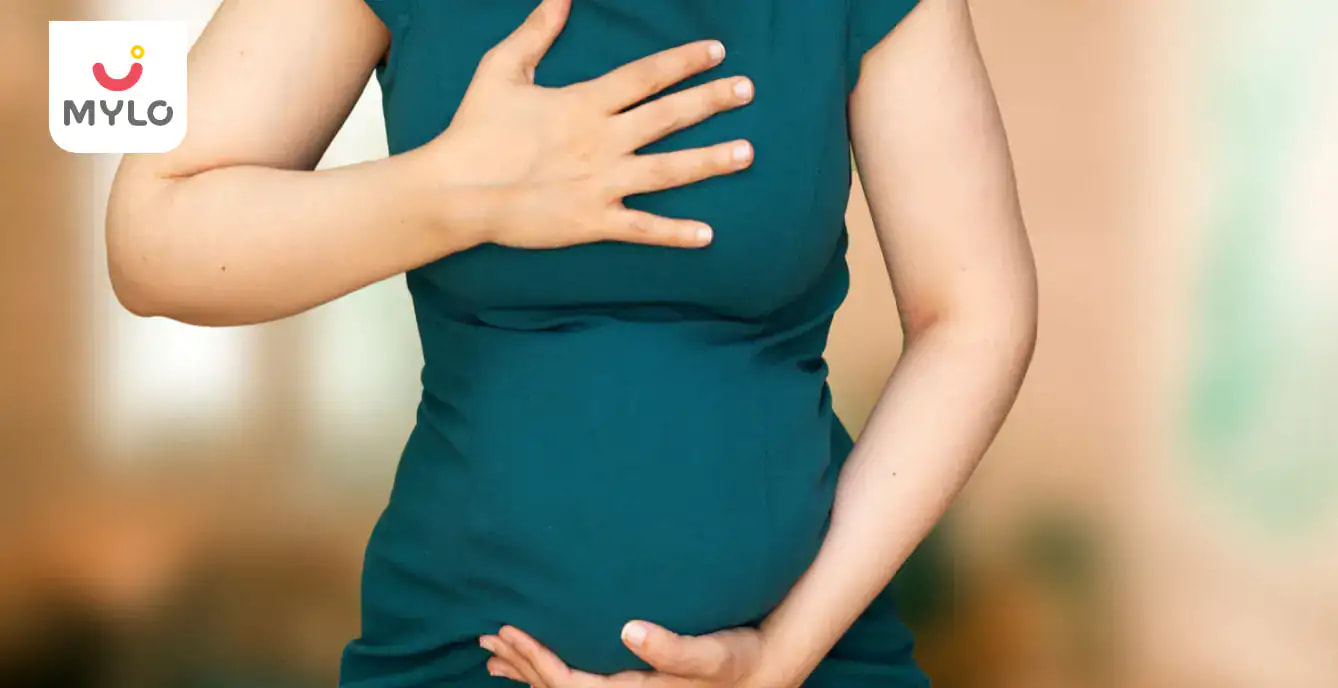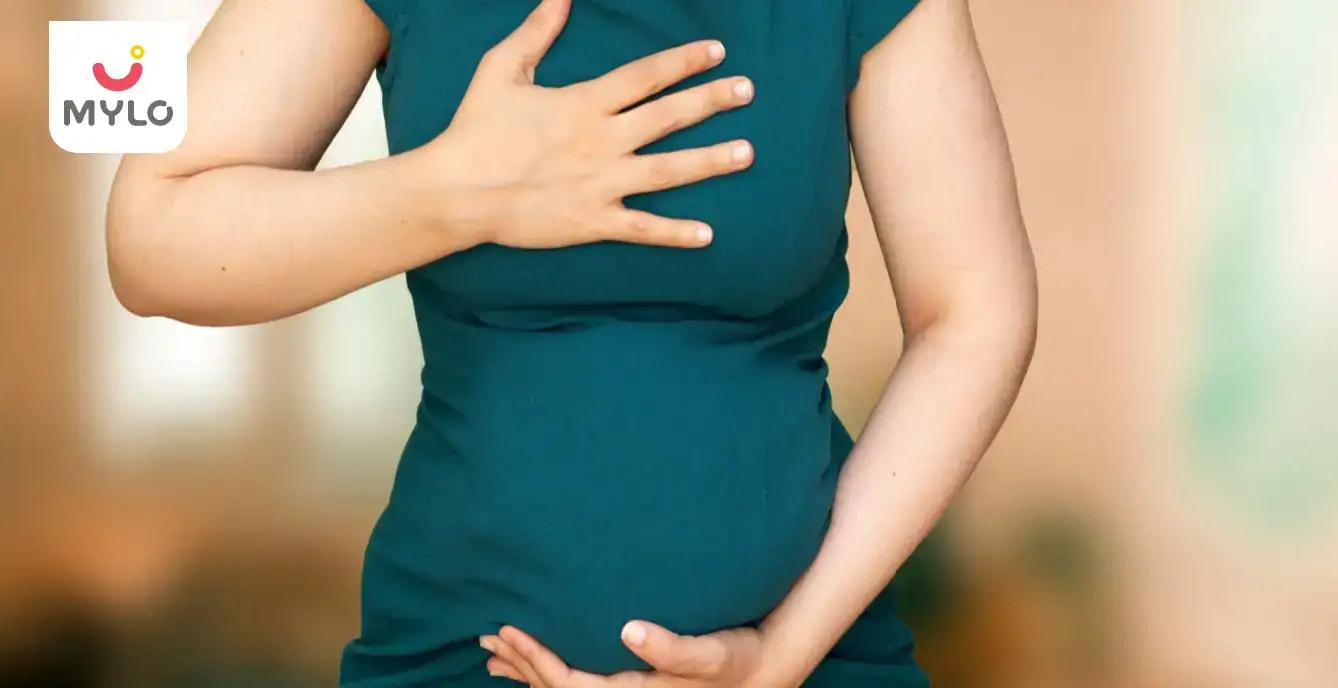Home

Gas & Bloating

5 Causes of Indigestion During Pregnancy
In this Article

Gas & Bloating
5 Causes of Indigestion During Pregnancy
Updated on 3 November 2023
Many women suffer from indigestion during pregnancy, which is often painful and uncomfortable. Indigestion (also known as heartburn) is pain or discomfort in the upper abdomen after eating or drinking, but it can happen sometime afterwards. Heartburn does not mean that it is related to your heart but gives a burning sensation in your throat or behind the breastbone when acidic foods and liquids move up to the esophagus. The oesophagus is a tube that connects the throat and stomach. It is also caused by hormonal changes and the growing baby pressing against the abdomen. Indigestion may happen anytime during pregnancy but are more severe during the third trimester of pregnancy. We can help ease indigestion by making a few changes in our diet and lifestyle, along with a few safe medicines during pregnancy.
Symptoms of Heartburn and Indigestion
If you have heartburn or indigestion, you may experience the following:
- Feel bloated
- Have a sour taste in your mouth
- Frequent burps and coughing
- Feel a burning sensation in your chest, especially after eating
- Nausea or vomiting
- Severe headaches
- Sudden swelling of feet and hands
Causes of Indigestion
Here are five reasons why you may experience indigestion during pregnancy:
1. Citrus Foods
Avoid Citrus foods such as tomatoes, oranges, and grapefruits as these lead to heartburn and indigestion. Tomatoes should be eaten in moderate quantities. Tomatoes and tomato products contain malic and citric acid, which causes the stomach to produce a lot of gastric acids, making your gastric acid levels rise high enough to force it up the oesophagus. Orange juices are also considered to be a trigger for heartburn. They contain ascorbic acid, which increases indigestion if consumed in large amounts.
2. Caffeine and Soda
Avoid caffeine and soda. Caffeine is a stimulant that can also increase your blood pressure and heart rate. As the pregnancy progresses, the body cannot break down the caffeine, which leads to no sleep and heartburn. Sugary drinks like soda should be avoided during pregnancy as they have many chemicals and calories that have no nutritional value. It can also be harmful to the fetus. Soda also contains carbonated water, which leads to an increase in blood pressure. Therefore frequent consumption of sodas can lead to obese babies and miscarriage.
3. Fried and Fatty Foods
Fried and Fatty foods lead to indigestion as they take longer to digest, thus triggering your stomach to create more acid and making you feel bloated. Fatty foods are very high in calories, leading to a lot of weight gain. Eating too much-saturated fat can increase the amount of cholesterol in your blood, increasing the chances of heart disease. Also, research says that consuming fatty foods has a greater risk of defective childbirth.
4. Hormonal changes
Pregnancy hormones can affect the digestive system. Progesterone, also known as the pregnancy hormone, acts as a muscle relaxer. While suffering from heartburn, the hormone can loosen the muscle, thus closing your stomach off the esophagus. They often lead to the slowing of digestion in the stomach and small and large intestines. The rapid increase in estrogen levels during the first trimester of pregnancy will often lead to nausea. Also, as the baby grows, the enlarged uterus can force the abdomen, thus pushing the stomach acids upwards. In rare cases, gallstones can also lead to heartburn or indigestion.
5. Chocolate
Avoid eating chocolate on an empty stomach. Limit the intake of chocolate, and if you have dark chocolate, it is much more beneficial as it improves the blood flow to the fetus. Avoid overeating chocolates for 2 reasons. Chocolate makes you less hungry, thus preventing you from eating healthy food causing, thus hampering your balanced diet. Secondly, chocolate contains caffeine, and pregnant women should keep their caffeine intake low and limit it to 200 mg daily. Drinking caffeinated beverages and chocolate as a snack is not a good combination as it might cross the caffeine limit. All together, chocolate should be avoided if you have unbalanced blood sugar levels, gestational diabetes, and an increase in weight gain.
You may also like: 4th Month Pregnancy Diet Chart (mylofamily.com)
How to deal with indigestion during pregnancy naturally?
Following are a few tips that will help prevent acid production and help avoid the discomfort of heartburn:
- Eat small meals throughout the day instead of having 3 big meals and also eat slowly
- Avoid fried, fatty, and spicy foods to avoid the risk of heartburn.
- Avoid drinking water while having a meal, as it can increase acid reflux and heartburn. You can drink water several minutes after eating
- Avoid wearing tight-fitting clothes while pregnant, as tight-fitting clothes can increase the pressure on your stomach.
- Avoid lying down directly after eating. Walk for some time to let your food digest.
- Balance your diet by having healthy foods with fibers that can help relax the digestive system.
- Practice deep breathing and relaxation or do yoga daily to keep a fit body and healthy lifestyle.
- Avoid eating gum or candy as they are artificial sweeteners and can cause acidity in your stomach.
- Maintain a good posture while eating. Always sit straight while eating to let your digestive system function smoothly.
- Avoid taking stress. Indulge yourself by reading a good book or spending time with your friends.
- Avoid drinking alcohol and smoking.
- Avoid eating food just before bedtime as stomach acids can pass smoothly upwards, thus leading to digestion problems.
Liquids to consume to avoid indigestion
There are a few drinks that you can sip throughout the day to ease digestion and which are also beneficial for your baby.
- Milk has a lot of nutritional benefits and helps in the development of the mother and unborn child. It is filled with calcium, thus helping with the development of the fetus and bones of the mother and the baby.
- Coconut water during pregnancy is very beneficial as it helps to relieve constipation, improves metabolism, maintains and regulates the pH level, and fights digestion. It is rich in electrolytes and helps in lowering high blood pressure levels.
- Herbal tea, such as green tea, ginger tea, and chamomile tea, is beneficial as it increases immunity, aids digestion, and cures morning sickness. Consuming it in limited quantity is beneficial.
- Water during pregnancy helps form the amniotic fluid around the fetus and aids digestion. You should drink at least 8 to 12 glasses of water every day during pregnancy.
Medications for indigestion during pregnancy
Few over-the-counter medications that can cure indigestion during pregnancy are:
- Antacids like Mylanta, Rolaids, and Tums can relieve heartburn by changing the stomach acids
- H2 blockers also help in preventing the acid produced by the stomach. They start to work within 2-3 hours and suppress the acid production for several hours.
- PPIs ( Proton pump inhibitors) treat frequent heartburn. They do not give immediate relief but take 2-3 days to show full effect.
Always consult a doctor before consuming the medicines as they react differently to everybody. Do not use it for longer than directed on the label. If the symptoms persist, consult your doctor.
Conclusion
While we all know that indigestion can be very painful and uncomfortable during pregnancy, it vanishes soon after the delivery, and the hormonal level also comes down to normal. Consult your healthcare professional if the heartburn is very severe.
References
NHS. Indigestion and heartburn in pregnancy. www.nhs.uk



Written by
khushboo jain
Get baby's diet chart, and growth tips

Related Articles
Related Topics
RECENTLY PUBLISHED ARTICLES
our most recent articles

Diet & Nutrition
গর্ভাবস্থায় আলুবোখরা: উপকারিতা ও ঝুঁকি | Prunes During Pregnancy: Benefits & Risks in Bengali

Diet & Nutrition
গর্ভাবস্থায় হিং | ঝুঁকি, সুবিধা এবং অন্যান্য চিকিৎসা | Hing During Pregnancy | Risks, Benefits & Other Treatments in Bengali

Women Specific Issues
স্তনের উপর সাদা দাগ: লক্ষণ, কারণ এবং চিকিৎসা | White Spots on Nipple: Causes, Symptoms, and Treatments in Bengali

Diet & Nutrition
গর্ভাবস্থায় পোহা: উপকারিতা, ধরণ এবং রেসিপি | Poha During Pregnancy: Benefits, Types & Recipes in Bengali

Diet & Nutrition
গর্ভাবস্থায় মাছ: উপকারিতা এবং ঝুঁকি | Fish In Pregnancy: Benefits and Risks in Bengali

Diet & Nutrition
গর্ভাবস্থায় রেড ওয়াইন: পার্শ্ব প্রতিক্রিয়া এবং নির্দেশিকা | Red Wine During Pregnancy: Side Effects & Guidelines in Bengali
- ইনার থাই চ্যাফিং: কারণ, উপসর্গ এবং চিকিৎসা | Inner Thigh Chafing: Causes, Symptoms & Treatment in Bengali
- গর্ভাবস্থায় ব্রাউন রাইস: উপকারিতা ও সতর্কতা | Brown Rice During Pregnancy: Benefits & Precautions in Bengali
- Velamentous Cord Insertion - Precautions, Results & Safety
- Unlock the Secret to Flawless Skin: 7 Must-Have Qualities in a Face Serum
- Unlock the Secret to Radiant Skin: How Vitamin C Serum Can Transform Your Complexion
- Gender No Bar: 10 Reasons Why Everyone Needs a Body Lotion
- Unlock the Secret to Radiant Skin How to Choose the Perfect Body Lotion for Your Skin Type
- Top 10 Reasons to Apply a Body Lotion After Every Bath
- Communication in Toddlers: Milestones & Activities
- How to Improve Vocabulary for Toddlers?
- A Comprehensive Guide to Understanding Placenta Accreta
- Vulvovaginitis in Toddlers Causes, Symptoms and Treatment
- A Comprehensive Guide to Understanding Cerebral Palsy in Children
- Bitter Taste in Mouth During Pregnancy: Understanding the Causes and Remedies


AWARDS AND RECOGNITION

Mylo wins Forbes D2C Disruptor award

Mylo wins The Economic Times Promising Brands 2022
AS SEEN IN

- Mylo Care: Effective and science-backed personal care and wellness solutions for a joyful you.
- Mylo Baby: Science-backed, gentle and effective personal care & hygiene range for your little one.
- Mylo Community: Trusted and empathetic community of 10mn+ parents and experts.
Product Categories
baby carrier | baby soap | baby wipes | stretch marks cream | baby cream | baby shampoo | baby massage oil | baby hair oil | stretch marks oil | baby body wash | baby powder | baby lotion | diaper rash cream | newborn diapers | teether | baby kajal | baby diapers | cloth diapers | laundry detergent 6472 | lactomama lactation granules |








